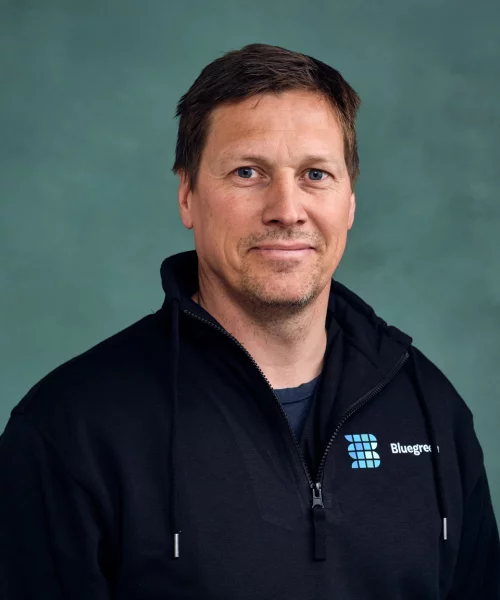The first full-scale test of the Marine Donut – Bluegreen's innovative closed fish farming facility for salmon – has delivered very promising results and confirmed that the facility functions as expected. This demonstrates that the technology will be an important step forward for the aquaculture industry.

The Marine Donut has been granted a development license through the Norwegian Directorate of Fisheries' scheme for innovation in aquaculture. According to the license, we will conduct two full-scale tests with food fish, both involving thorough documentation and evaluation of various technical and biological parameters.
In the first full-scale test, 195,000 salmon with an average weight of approximately 3 kg were introduced into the Marine Donut in three separate batches. After 101 days, the facility was emptied, and the salmon were sent for processing.
"This full-scale test has provided valuable data and insights that will be crucial for further development of this groundbreaking technology," says Geir Andresen, CCO at Bluegreen. He has been responsible for the construction and commissioning of this first version of the Marine Donut, which was delivered to SalMar in 2023. The facility is now operational at Seterneset, near Molde.

The Marine Donut is a floating closed farming facility made from HDPE material. It stands apart from traditional open pens by eliminating challenges like sea lice and fish escapes. The goal is to reduce the environmental impact of aquaculture while improving fish welfare. This has the potential to enhance profitability for fish farmers.
During the testing period, we closely monitored several production elements, including water quality, technical performance, fish health, and welfare. The test, which lasted several months, has provided a strong indication of the Marine Donut's potential to improve efficiency and sustainability in the aquaculture industry.
SalMar has prepared an interim report from the first production cycle. According to the report, several measured parameters confirm that the Marine Donut performs as expected.
Water Quality: Monitoring has shown good levels of oxygen, pH, salinity, and temperature. Some challenges related to turbidity (water clarity) measurements were identified, but these are being resolved and have not impacted the water quality inside the pen.
Fish Health and Welfare: Overall, the fish have exhibited good health and low mortality rates, despite carrying pancreas disease (PD) into the Marine Donut. Comprehensive monitoring of fish welfare has been conducted, including assessments of wounds, cataracts, and deformities, as well as gill health and stress levels (measured through feces samples). All results indicate very good fish welfare.
“ Total fish mortality is only 0,8 %! Geir Andresen, CCO Bluegreen
Technical Performance: Water exchange has functioned well, but some adjustments were necessary after discrepancies were observed between measured and calculated current speeds. The system has been improved along the way to optimize performance.
Read more about the interim report
In October, the facility was emptied of fish, and 195,000 salmon were sent for processing. The extraction went very smoothly, with minimal stress for the fish.

"It’s a major operation when approximately 1,000 tons of fish are being delivered for the first time, so of course, we were excited," says Andresen. "We worked for just over 24 hours, including preparations, and filled two well boats."
Marine Donut eases the extraction process while ensuring minimal stress for the fish. The fish are gathered in a controlled manner before being gently suctioned into the well boats.
"When emptying the Marine Donut, we raise the facility by about 20% and connect it to the well boat. Then, it’s tilted by 4 degrees," explains Andresen. "This ensures good water flow and optimal conditions for the fish throughout the process. At the same time, we gradually reduce the water volume to keep the fish’s environment stable for as long as possible."
This minimizes stress and improves fish welfare, while the emptying method is both gentle and efficient. During the process, representatives from SalMar and Bluegreen were able to monitor and adjust parameters such as water flow, oxygen levels, and the tilting and raising of the facility.
"We chose to be extra cautious since this was the first time with full biomass," says Andresen. "Next time, we can probably complete the operation in half the time."
Oxygen levels in the water remained stable throughout the emptying process, demonstrating that the fish were not stressed. "This was a great success," concludes Andresen with satisfaction.
The results from this full-scale test, along with the insights we have gained, prove that the Marine Donut is a commercially viable product. We anticipate that the upcoming launch of the environmental flexibility scheme will quickly fill our production capacity, and we are now accepting orders on an ongoing basis.
Reserve Your Spot in the Queue Now
"Marine Donut offers competitive production costs from a holistic perspective," concludes Andresen.

